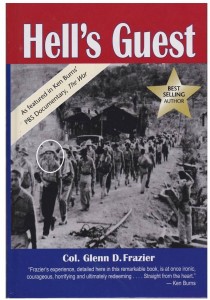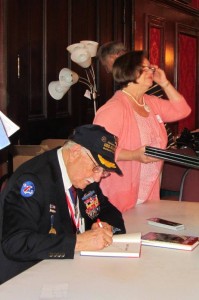24 Jun Glenn D. Frazier

Glenn Frazier’s book – I have drawn a circle around his face in this photo taken by a Japanese soldier during the Bataan Death March.
The Atlanta World War II Roundtable meets monthly. More than a hundred WWII veterans with their friends and families fill the room for lunch and a speaker. The organization is dedicated to preserving the history of WWII and records each program as well as each personal story as guests are introduced. Yesterday was its 260th meeting. I knew that our guest was Glenn Frazier, a survivor of the Bataan Death March, and I was there early.
Speaking of early, lunch starts at 11:30. The first time I attended I arrived at what I thought was a reasonable 11:15. No way. These ladies and gentlemen arrive early. Military time.
As I drove into Atlanta I kept thinking, “Where have I heard of Glenn Frazier?” The name was so familiar to me. The minute I walked into the room and looked at the screen it hit me. Col. Frazier is featured in the documentary film, book, audiobook, mini-series The War. I’ve listened to the audiobook twice now, all the way through and I’m sure I’ll listen again. It’s a wonderful history lesson. Ken Burns told the story of Glenn Frazier from Mobile Alabama as he ran away from home, lied about his age, joined the army and went to the Philippines.
Frazier first showed us an excerpt from The War documentary about his experiences as he ran away from home in June of 1941 to join the Army, went to the Philippines and then was part of the Bataan Death March. “If I had known what was ahead of me I would have chosen Death.”
He survived the trip to Camp O’Donnell, the final destination for the POW’s, at least for a while. He was then sent to Japan to work in a slave labor camp on the western coast of Japan. The Japanese guards had standing orders, the minute an invasion took place on the mainland, to shoot all POW’s. Two days before the war ended, Frazier and his comrades had been ordered to dig their own grave. Then suddenly the guards were gone. The POW’s walked out, took a train to Tokyo and found the US Army. Of the 306 prisoners who had come over to Japan with Glenn Frazier, only 25 survived.
That wasn’t the end of the story, however. “My war lasted for thirty years.” You can read more about what it took for him to forgive and recover (never forget) at Glenn Frazier’s website, Hell’s Guest.
The horrors of the war were with me everyday and night for the next twenty-nine to thirty years. At times, I wished I had never come home. How peaceful it would be to lay in a quite place and find the peace that only comes with death. (Glenn D. Frazier, EX-POW, Survivor of Bataan Death March. Excerpt from his writing Unpleasant Return)
I bought a copy of Glenn Frazier’s book, Hell’s Guest which I’m sure will explain in detail what it took for him to survive both being there and then coming home. Immediately after his release the VA psychiatrist told him to “go out and act normal; you’ll feel normal.”
Thankfully our armed services have come a long way in recognizing and dealing with post-traumatic stress disorder. I suspect that anyone who has served in the military might argue that they still have a long way to go.
One of the veterans in the audience asked him how he ever got over the “hate.” His answer? “…with a lot of help from my preacher.”



Barbara Ann Davis
Posted at 04:49h, 25 JuneWhat an honor for you to be able to meet and hear him.